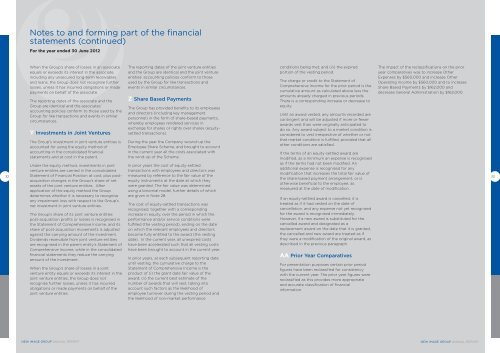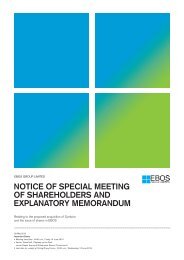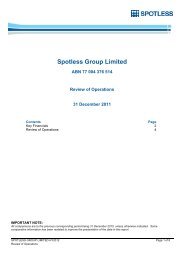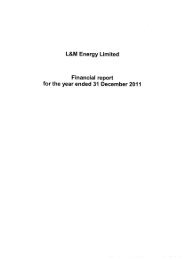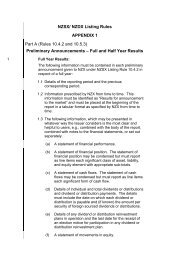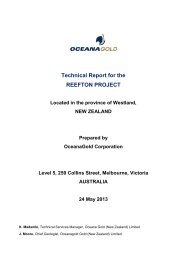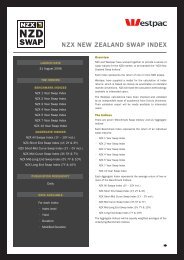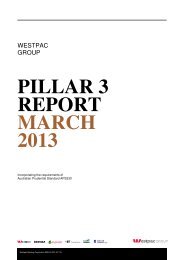New Image Annual Report 2012 concept.indd - NZX
New Image Annual Report 2012 concept.indd - NZX
New Image Annual Report 2012 concept.indd - NZX
You also want an ePaper? Increase the reach of your titles
YUMPU automatically turns print PDFs into web optimized ePapers that Google loves.
Notes to and forming part of the financial<br />
statements (continued)<br />
For the year ended 30 June <strong>2012</strong><br />
32<br />
When the Group’s share of losses in an associate<br />
equals or exceeds its interest in the associate,<br />
including any unsecured long-term receivables<br />
and loans, the Group does not recognise further<br />
losses, unless it has incurred obligations or made<br />
payments on behalf of the associate.<br />
The reporting dates of the associate and the<br />
Group are identical and the associates’<br />
accounting policies conform to those used by the<br />
Group for like transactions and events in similar<br />
circumstances.<br />
Y Investments in Joint Ventures<br />
The Group’s investment in joint venture entities is<br />
accounted for using the equity method of<br />
accounting in the consolidated financial<br />
statements and at cost in the parent.<br />
Under the equity method, investments in joint<br />
venture entities are carried in the consolidated<br />
Statement of Financial Position at cost, plus postacquisition<br />
changes in the Group’s share of net<br />
assets of the joint venture entities. After<br />
application of the equity method the Group<br />
determines whether it is necessary to recognise<br />
any impairment loss with respect to the Group’s<br />
net investment in joint venture entities.<br />
The Group’s share of its joint venture entities<br />
post-acquisition profits or losses is recognised in<br />
the Statement of Comprehensive Income, and its<br />
share of post-acquisition movements is adjusted<br />
against the carrying amount of the investment.<br />
Dividends receivable from joint venture entities<br />
are recognised in the parent entity’s Statement of<br />
Comprehensive Income, while in the consolidated<br />
financial statements they reduce the carrying<br />
amount of the investment.<br />
When the Group‘s share of losses in a joint<br />
venture entity equals or exceeds its interest in the<br />
joint venture entities, the Group does not<br />
recognise further losses, unless it has incurred<br />
obligations or made payments on behalf of the<br />
joint venture entities.<br />
The reporting dates of the joint venture entities<br />
and the Group are identical and the joint venture<br />
entities’ accounting policies conform to those<br />
used by the Group for like transactions and<br />
events in similar circumstances.<br />
Z Share Based Payments<br />
The Group has provided benefits to its employees<br />
and directors (including key management<br />
personnel) in the form of share-based payments,<br />
whereby employees rendered services in<br />
exchange for shares or rights over shares (equitysettled<br />
transactions).<br />
During the year the Company wound-up the<br />
Employee Share Scheme, and brought to account<br />
in the current year all the costs associated with<br />
the wind-up of the Scheme.<br />
In prior years the cost of equity-settled<br />
transactions with employees and directors was<br />
measured by reference to the fair value of the<br />
equity instruments at the date at which they<br />
were granted. The fair value was determined<br />
using a binomial model, further details of which<br />
are given in Note 28.<br />
The cost of equity-settled transactions was<br />
recognised, together with a corresponding<br />
increase in equity, over the period in which the<br />
performance and/or service conditions were<br />
fulfilled (the vesting period), ending on the date<br />
on which the relevant employees and directors<br />
become fully entitled to the award (the vesting<br />
date). In the current year, all unexpired costs<br />
have been accelerated such that all vesting costs<br />
have been brought to account in the current year.<br />
In prior years, at each subsequent reporting date<br />
until vesting, the cumulative charge to the<br />
Statement of Comprehensive Income is the<br />
product of (i) the grant date fair value of the<br />
award; (ii) the current best estimate of the<br />
number of awards that will vest, taking into<br />
account such factors as the likelihood of<br />
employee turnover during the vesting period and<br />
the likelihood of non-market performance<br />
conditions being met; and (iii) the expired<br />
portion of the vesting period.<br />
The charge or credit to the Statement of<br />
Comprehensive Income for the prior period is the<br />
cumulative amount as calculated above less the<br />
amounts already charged in previous periods.<br />
There is a corresponding increase or decrease to<br />
equity.<br />
Until an award vested, any amounts recorded are<br />
contingent and will be adjusted if more or fewer<br />
awards vest than were originally anticipated to<br />
do so. Any award subject to a market condition is<br />
considered to vest irrespective of whether or not<br />
that market condition is fulfilled, provided that all<br />
other conditions are satisfied.<br />
If the terms of an equity-settled award are<br />
modified, as a minimum an expense is recognised<br />
as if the terms had not been modified. An<br />
additional expense is recognised for any<br />
modification that increases the total fair value of<br />
the share-based payment arrangement, or is<br />
otherwise beneficial to the employee, as<br />
measured at the date of modification.<br />
If an equity-settled award is cancelled, it is<br />
treated as if it had vested on the date of<br />
cancellation, and any expense not yet recognised<br />
for the award is recognised immediately.<br />
However, if a new award is substituted for the<br />
cancelled award and designated as a<br />
replacement award on the date that it is granted,<br />
the cancelled and new award are treated as if<br />
they were a modification of the original award, as<br />
described in the previous paragraph.<br />
AA Prior Year Comparatives<br />
For presentation purposes certain prior period<br />
figures have been reclassified for consistency<br />
with the current year. The prior year figures were<br />
reclassified as this provides more appropriate<br />
and accurate classification of financial<br />
information.<br />
The impact of the reclassifications on the prior<br />
year comparatives was to increase Other<br />
Expenses by $560,000 and increase Other<br />
Operating Income by $560,000 and to increase<br />
Share Based Payments by $162,000 and<br />
decrease General Administration by $162,000.<br />
33<br />
NEW IMAGE GROUP ANNUAL REPORT<br />
NEW IMAGE GROUP ANNUAL REPORT


